- Home
- A. S. Byatt
Angels & Insects: Two Novellas
Angels & Insects: Two Novellas Read online
Acclaim for A. S. BYATT’S
Angels & Insect
“A pleasure to read … both stories are essentially romantic fantasies, written with grace and an expert use of literary reference.”
—The Atlantic
“[Offers] that greatest pleasure of a historical novel: flawless research mobilized to support an entrancing story.… Byatt writes with meticulous realism about a world no one alive has ever set foot in.”
—Village Voice Literary Supplement
“Neatly contrasting and vividly effective stories of people grappling with the ineradicable loss of love—both divine and human—in ways very much relevant today; and sometimes, with luck and good faith, rediscovering it in unexpected places. [Byatt is] a formidable novelist indeed.”
—Chicago Tribune
“These canny tales [full of] subtlety and shrewdness … evoke [a] concentrated and fine-grained intensity. Nabokov surely would have appreciated Byatt’s exacting attention. [She] puts tingling flesh on the bones of the old Victorian debate over biological determinism and the descent of man [and] showcases her flair for exposing the mannerly subterfuges and erotic undercurrents of the Victorian sitting room.”
—Boston Globe
“Charm and narrative drive [are] found in abundance.… Where Byatt is erudite she is also playful; where she is ironic she is also respectful; where she is robust and sensuous she is also delicate and careful. Byatt’s profound feeling for human sorrow animates Angels & Insects, creating vitality and energy out of the ashes of suffering and loss.”
—USA Today
“Two delicious tales of the marvelous, evoked through precise, striking descriptions. The almost lurid Victorian devotion to the dead, the sanctification of ‘undying’ love and, finally, the supremacy of the physical world are touched on lightly yet poignantly. The comic undertone only emphasizes Byatt’s generosity of spirit.”
—San Francisco Examiner
“As in her Booker Prize-winning novel Possession, Byatt immerses us in the Victorian world. You can see the influence of George Eliot and Iris Murdoch in her prose’s mix of philosophical seriousness, modernist irony, and old-fashioned realism.… Henry James also comes to mind.”
—Boston Phoenix Literary Section
“Angels & Insects offers two brief visions of a world which Byatt understands uniquely well: 19th-century England and the men and women who shaped it. Taken separately, either tale could stand as a perfectly formed … work. Together they form something rather more complex and substantial.”
—Washington Post Book World
“An exquisitely executed, intelligent, and diverting diptych.… Byatt’s lushly descriptive prose has a Pre-Raphaelite vividness of color and detail.”
—Christian Science Monitor
A. S. BYATT
Angels & Insect
A. S. Byatt is the author of the Booker Prize–winning Possession: A Romance. She has taught English and American literature at University College, London, and is a distinguished critic and reviewer. Her critical work includes Degrees of Freedom (a study of Iris Murdoch), Unruly Times: Wordsworth and Coleridge in Their Time, and Passions of the Mind: Selected Essays. She is also the author of five previously published works of fiction, Shadow of a Sun, The Game, The Virgin in the Garden, Still Life, and Sugar and Other Stories. The Matisse Stories, a collection of short fiction, is her most recent work.
BOOKS BY A. S. BYATT
FICTION
Shadow of a Sun
The Game
The Virgin in the Garden
Still Life
Sugar and Other Stories
Possession
Angels & Insects
The Matisse Stories
CRITICISM
Degrees of Freedom:
The Novels of Iris Murdoch
Unruly Times:
Wordsworth and Coleridge in Their Times
Passions of the Mind
First Vintage International Edition, April 1994
Copyright © 1992 by A. S. Byatt
All rights reserved under International and Pan-American
Copyright Conventions. Published in the United States by Vintage Books,
a division of Random House, Inc., New York. Originally published in
Great Britain by Chatto & Windus Ltd., London, in 1992.
First published in the United States by Random House, Inc.,
New York, in 1993.
Library of Congress Cataloging-in-Publication Data
Byatt, A. S. (Antonia Susan), 1936–
Angels & insects: two novellas / A. S. Byatt —
1st Vintage International ed.
p. cm.
eISBN: 978-0-307-81959-8
I. Title. II. Title: Angels and insects.
PR6052.Y52A83 1994
823′.914—dc20 93-43495
v3.1
For Jean-Louis Chevalier
Contents
Cover
About the Author
Other Books by This Author
Title Page
Copyright
Dedication
Morpho Eugenia
The Conjugial Angel
Acknowledgments
Illustration
Morpho Eugenia
‘You must dance, Mr Adamson,’ said Lady Alabaster from her sofa. ‘It is very kind of you to sit by me, and fetch glasses of lemonade, but I really do think you must dance. Our young ladies have made themselves beautiful in your honour, and I hope their efforts will not have been in vain.’
‘I think they are all delightful,’ said William Adamson, ‘but I am out of practice at ballroom dancing.’
‘Not much dancing in the jungle,’ stated Mr Edgar Alabaster.
‘On the contrary. There is a great deal of dancing. There are religious festivals—Christian festivals—which occupy weeks together with communal dancing. And in the interior there are Indian dances where you must imitate the hops of woodpeckers, or the wriggle of armadillos, for hour after hour.’ William opened his mouth to say more, and closed it again. Didactic rushes of information were a great shortcoming in returning travellers.
Lady Alabaster moved some of her black silk rolls of flesh on the rosy satin of her sofa. She persisted. ‘I shall ask Matty to find you a pretty partner, unless you can pick one out for yourself.’
The shimmering girls whirled past in the candlelight, shell-pink and sky-blue, silver and citron, gauze and tulle. A small orchestra, two fiddles, a flute, a bassoon and a cello scraped and shrilled and boomed in the minstrels’ gallery. William Adamson felt constricted, but composed, inside a dress suit borrowed from Lionel Alabaster. He remembered a festa on the Rio Manaquiry, lit by lamps made of half an orange-skin filled with turtle oil. He had danced with the Juiza, the lady of the revels, barefoot and in his shirtsleeves. There, his whiteness itself had given him automatic precedence at table. Here he seemed sultry-skinned, with jaundice-gold mixed into sun-toasting. He was tall and naturally bony, almost cadaverous after his terrible experiences at sea. The pale people in the soft light polka’d past, murmuring to each other. The music stopped, the partners walked away from the floor, clapping and laughing. All three Alabaster daughters were being conducted back to the group round their mother. Eugenia, Rowena, and Enid.
They were all three pale-gold and ivory creatures, with large blue eyes and long pale silky lashes visible only in certain lights and shadows. Enid was the youngest, still with a trace of childish plumpness, wearing blush-pink organdie trimmed with white rosebuds, and a wreath of rosebuds and a net of rosy ribbons in her hair. Rowena was the tallest, the one who laughed, with richer colour in her cheeks and lips, with the coil of hair in the nape of her neck studde
d with pearls and blush-tipped daisies. The eldest, Eugenia, wore white tarlatan over a lilac silk underskirt, and had a cluster of violets at her breast, and more violets at her waist, and violets and ivy woven in and out of her sleek golden head. Their brothers, too, had the gold and white colouring. They made a charming and homogeneous group.
‘Poor Mr Adamson had no idea we were having a Ball at the beginning of his visit,’ said Lady Alabaster. ‘Your father wrote immediately to invite him when he heard how he had been rescued at sea after being cast away for fifteen days, very terrible, in the Atlantic. And your father, naturally, thought more of his eagerness to see Mr Adamson’s specimens than he did of our own projected entertainment. So Mr Adamson arrived to find the whole house in turmoil and servants running hither and thither in the greatest possible disorder. Fortunately he is much of a height with Lionel, who was able to help with the suit.’
‘I should have had no dress suit in any event,’ said William. ‘All my earthly belongings are burned, or drowned, or both, and they never included a dress suit. During my last two years at Ega I had not even a pair of shoes.’
‘Well, well,’ said Lady Alabaster easily, ‘you must be possessed of immense resources of strength and courage. I am sure they will be equal to a turn around the dance floor. You must do your duty too, Lionel and Edgar. There are more ladies than gentlemen here. There always are, I do not know how it comes about, but there are always more ladies.’
The music struck up again, a waltz. William bowed to the youngest Miss Alabaster, and asked if she were free to dance. She blushed, and smiled and accepted.
‘You look at my shoes with a new consciousness,’ said William, as he led her out. ‘You are afraid not only that I shall dance clumsily but that my unaccustomed feet will stumble into your pretty slippers. I shall endeavour not to. I shall try very hard. You must help me, Miss Alabaster, you must take pity on my inadequacies.’
‘This must seem very strange to you,’ said Enid Alabaster, ‘after so many years of danger and hardship and solitude, to take part in this kind of entertainment.’
‘It is quite delightful,’ said William, watching his feet, and gaining confidence. The waltz was danced in certain kinds of society in Para and Manáos; he had whirled around with olive-skinned and velvet-brown ladies of doubtful virtue and no virtue. There was something alarming in the soft, white creature in his arms, at once so milky-wholesome and so airily untouchable. But his feet were confident.
‘You know very well how to waltz,’ said Enid Alabaster.
‘Not so well as your brother, I see,’ said William.
Edgar Alabaster was dancing with his sister, Eugenia. He was a big, muscular man, his blond hair crimping in windswept, regular waves over his long head, his back stiff and straight. But his large feet moved quickly and intricately, tracing elegant skipping patterns beside Eugenia’s pearly-grey slippers. They were not speaking to each other. Edgar looked over Eugenia’s shoulder, faintly bored, surveying the ballroom. Eugenia’s eyes were half closed. They whirled, they floated, they checked, they pirouetted.
‘We practise a lot in the schoolroom,’ said Enid. ‘Matty plays the piano and we dance and dance. Edgar likes horses better of course, but he likes any kind of movement, we all do. Lionel’s not so good. He doesn’t let himself go in the same way. Some days, I think we could dance forever, like the princesses in the story.’
‘Who wore their slippers out secretly every night.’
‘And were exhausted in the mornings, and no one could understand it.’
‘And refused to marry because they loved dancing so much.’
‘Some married ladies still dance. There is Mrs Chipperfield, look, in the bright green. She dances very well.’
Edgar and Eugenia had left the floor and returned to their positions beside Lady Alabaster’s sofa. Enid went on talking to William about the family. As they passed the sofa again, she said, ‘Eugenia used to be the best of all, before she was unhappy.’
‘Unhappy?’
‘She was to be married, you see, only Captain Hunt, her fiancé, died quite suddenly. It was a terrible shock, poor Eugenia is only just recovering. It is like being a widow without being married, I think. We don’t talk about it. But everyone knows of course. I’m not tittle-tattling, you know. I just thought—since you are to stay here a little time—it might be helpful to you to know.’
‘Thank you. You are very kind. I shall not now say anything unwittingly foolish. Do you think she would dance with me, if I asked her?’
‘She might.’
She did. She thanked him gravely, with a slight lift of her soft lips and no change in her deep, distant eyes—or at least that was how he saw them—and put up her hands gracefully to take his. Her presence within his grasp—that was how he thought of it—was lighter, more floating, less springing than Enid’s. Her feet were deft. He looked down from his height at her pale face and saw her large eyelids, blue-veined, almost translucent, and the thick fringes of white-gold hairs on their rims. Her slender fingers, resting in his, were gloved and only faintly warm. Her shoulders and bust rose white and flawless from the froth of tulle and tarlatan like Aphrodite from the foam. A simple row of pearls, soft white on soft white with a shimmering difference, rested on her collarbone. She was both proudly naked and wholly untouchable. He guided her round the floor, and felt, to his shame and amazement, unmistakable stirrings and quickenings of bodily excitement in himself. He shifted himself inside Lionel’s dress suit, and reflected—he was, after all, a scientist and an observer—that these dances were designed to arouse his desire in exactly this way, however demure the gloves, however sweetly innocent the daily life of the young woman in his arms. He remembered the palm-wine dance, a swaying circle which at a change in rhythm broke up into hugging couples who then set upon and danced round the one partnerless scapegoat dancer. He remembered being grabbed and nuzzled and rubbed and cuddled with great vigour by women with brown breasts glistening with sweat and oil, and with shameless fingers.
Nothing he did now seemed to happen without this double vision, of things seen and done otherwise, in another world.
‘You are thinking of the Amazon,’ said Eugenia.
‘Are you gifted at thought-reading?’
‘Oh no. Only you looked far away. And that is far away.’
‘I was thinking of the beauty of everything here—the architecture, and the young ladies in their gauzes and laces. I was looking at this very fine Gothic fan vaulting, which Mr Ruskin says is like the ancient imagination of trees in a forest, overarching, and I was thinking of the palms towering in the jungle, and all the beautiful silky butterflies sailing amongst them, high up and quite out of reach.’
‘How strange that must be,’ said Eugenia. She paused. ‘I have made a beautiful display—a kind of quilt, or embroidery almost—out of some of the earlier specimens you sent my father. I have pinned them out very carefully—they are exquisitely pretty—they give a little the effect of a scalloped cushion, only their colours are more subtle than any silks could be.’
‘The natives believed we were collecting them as patterns for calico. That was the only way they could explain our interest to themselves, since the butterflies are not good to eat—indeed, I believe many are poisonous, feeding on poisonous plants. And it is those who are the brightest, and sail about slowly and proudly, flaunting their colours as a kind of warning. They are the males, of course, making themselves brilliant for their brown mates. The Indians resemble them in that. It is the men who dress in brilliant feathers and coloured paint and stones. The females are quieter. Whereas here we men wear carapaces like black beetles. And you ladies are like a flower garden in full flight.’
‘My father was so sorry to hear you had lost so much in the terrible shipwreck. For your sake, and for his own. He was eager to add to his collection.’
‘I managed to save one or two of the rarest and most beautiful. I kept them in a special box by my pillow—I liked to look at them�
�and so they were there to hand to be snatched up, when we saw that we must abandon ship. There is pathos in saving a dead butterfly. But one in particular is a rarity—I shall say no more now—but I believe your father will be glad to have it—and you too—but it is to be a surprise.’
‘I hate people who tell me I am to have a surprise and will not tell me what it is.’
‘You do not like suspense?’
‘No. No, I don’t. I like to know where I am. I am afraid of surprises.’
‘Then I must remember never to surprise you,’ he said, and thought he sounded foolish, and was not surprised when she did not answer. There was a little crimson stain, the size of a medium ant, where her round breasts met, or parted from, each other, where the violet shadow began. There were blue veins here and there in the creamy surface, just under the skin. His body pulled at him again, and he felt dirty and dangerous. He said, ‘I feel privileged to be allowed to be a temporary part of your happy family, Miss Alabaster.’
She looked up at him, on this, and opened the large, blue eyes. They were washed with what looked like unshed tears.
‘I love my family, Mr Adamson. We are very happy together. We love each other very much.’
‘You are fortunate.’
‘Oh yes. We are. I know that. We are very fortunate.’
Since his ten years in the Amazon, and even more since his delirious days afloat in a lifeboat in the Atlantic, William had come to see clean, soft English beds as the heart of some earthly Bower of Bliss. Although it was well after midnight when he retired to his room, there was a thin, silent housemaid waiting to bring him hot water, and to warm his sheets, whisking past him with downturned eyes on noiseless feet. His bedroom had a small carved bay window, with a stained glass roundel depicting two white lilies. There were modern comforts within its Gothic walls—a mahogany bed, intricately carved with ivy leaves and holly berries, spread with goosefeather mattress, soft woollen blankets, and a snowy bedspread embroidered with Tudor roses. He did not, however, climb immediately between the sheets, but carried his candle to his desk and got out his journal.

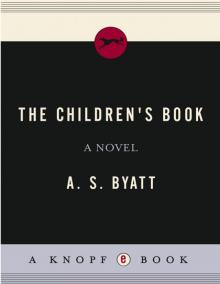 The Children's Book
The Children's Book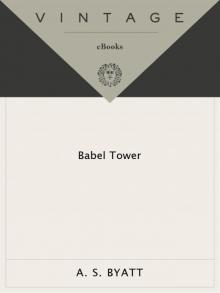 Babel Tower
Babel Tower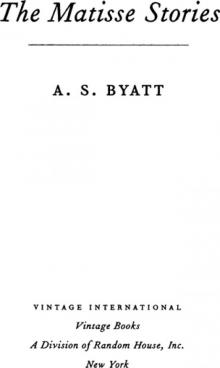 The Matisse Stories
The Matisse Stories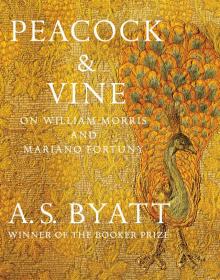 Peacock & Vine: On William Morris and Mariano Fortuny
Peacock & Vine: On William Morris and Mariano Fortuny Elementals: Stories of Fire and Ice
Elementals: Stories of Fire and Ice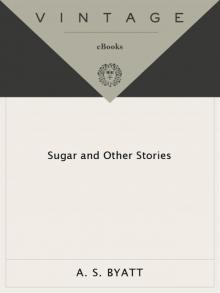 Sugar and Other Stories
Sugar and Other Stories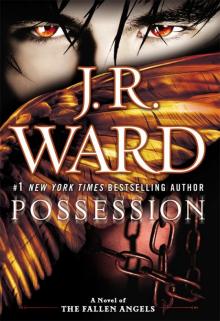 Possession
Possession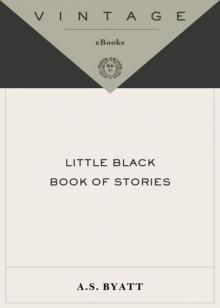 Little Black Book of Stories
Little Black Book of Stories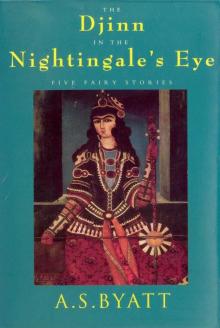 The Djinn in the Nightingale's Eye
The Djinn in the Nightingale's Eye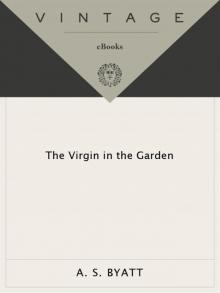 The Virgin in the Garden
The Virgin in the Garden The Game
The Game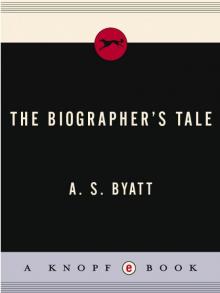 The Biographer's Tale
The Biographer's Tale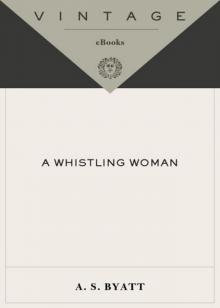 A Whistling Woman
A Whistling Woman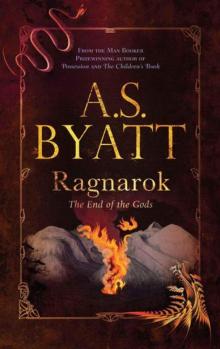 Ragnarok
Ragnarok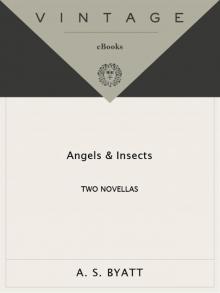 Angels & Insects: Two Novellas
Angels & Insects: Two Novellas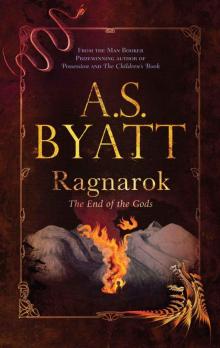 Ragnarok: the End of the Gods (Myths)
Ragnarok: the End of the Gods (Myths)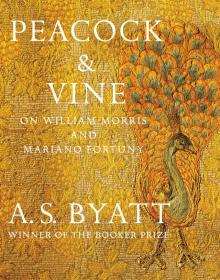 Peacock & Vine
Peacock & Vine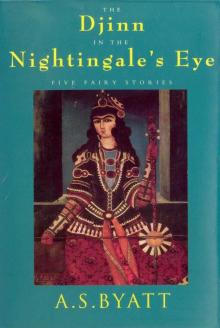 The Djinn in the Nightingale's Eye (Vintage International)
The Djinn in the Nightingale's Eye (Vintage International)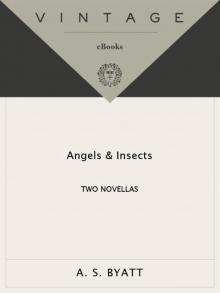 Angels and Insects
Angels and Insects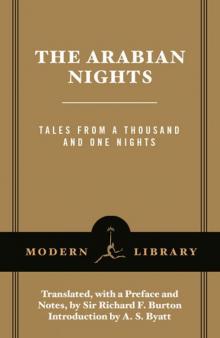 The Arabian Nights: Tales from a Thousand and One Nights (Modern Library Classics)
The Arabian Nights: Tales from a Thousand and One Nights (Modern Library Classics) Elementals
Elementals